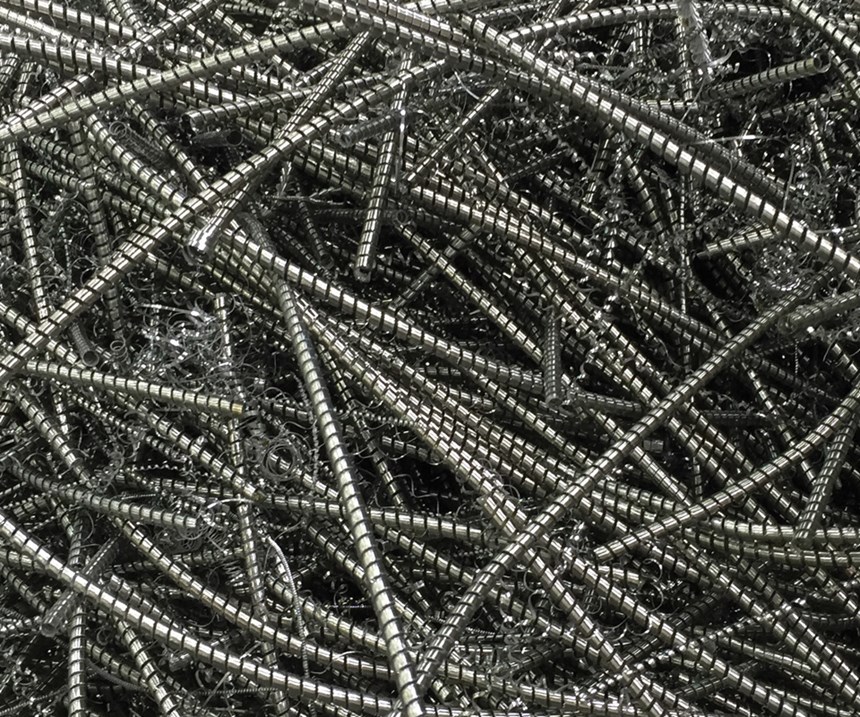Recycling in the Precision Machining Industry
Tossing away an aluminum can wastes as much energy as pouring out half of that can’s volume of gasoline.
Environmental responsibility has been part of the machining industry for so long that it is diffi cult to recognize that our systems have always been focused on recycling and closing the loop on raw materials and scrap between our shops and our suppliers.
The raw materials that we machine, such as carbon and alloy steel, stainless steel, aluminum, brass and other alloys, are produced using a high percentage of scrap (recycled) feedstock. The material that is removed from the bar by our machining processes is captured, stripped of oils, and then sent back to the mill via recyclers for re-melting into new material. By tonnage, steel is the most recycled material on the planet, more than all other materials combined.
According to steel.org, steel retains an extremely high overall recycling rate, which stood at 88 percent in 2012. The amazing metallurgical properties of steel allow it to be recycled continually, with no degradation in performance from one product to another. The steel and stainless steel that we purchase is usually made by an electric furnace process, so depending on the grade, 85 to 98 percent of the content of the steel bars we purchase are recycled steel, re-melted, recast and rerolled into bars for machining. The remainder of the content is made up of additional ingredients added to help adjust the material’s chemical analysis to assure grade and property compliance.
Brass- and copper-containing scrap in our shops is similarly segregated, returned, re-melted, recast and rerolled into products for machining. According to the Copper Development Association, “Each year in the U.S.A., nearly as much copper is recovered from recycled material as is derived from newly mined ore. And when you exclude wire production, most of it uses newly refi ned copper. The amount of copper used by copper and brass mills, ingot makers, foundries, powder plants and other industries show that almost three-fourths (72 percent) comes from recycled copper scrap.” About half of that scrap comes from our industry as screw machine turnings, and because of the strong recycling content, North America is not dependent on foreign supplies for copper.
Aluminum scrap is also recycled in our shops. The high energy content in aluminum makes the recycling of aluminum critical. Aluminum.org points out that recycling aluminum saves more than 90 percent of the energy that would be needed to create a comparable amount of the metal from raw materials. Tossing away an aluminum can wastes as much energy as pouring out half of that can’s volume of gasoline. No wonder more than 75 percent of all aluminum ever produced is still in use.
Scrap segregation practices are in place so that we can minimize the cross contamination of the various chemical elements contained in one material with another. For instance, think high chromium and nickel in stainless steels that raise the residual levels if combined into plain carbon steel at the time of re-melt.
In addition to the chips and bar end residue from our operations, we also recycle the steel banding, clips and wires used to package our barstock. We employ processes to remove the oil and metalworking fluids from our scrap before shipping it out to recyclers, so our oil and metalworking fluids are recovered and recycled as well. Metalworking fluids, cleaning solvents and other petroleum-based products used in our shops are also controlled, recycled and/or manifested for off-site reclamation.
Our tooling contains tungsten carbide, and a number of our industry vendors have recycling programs for these as well.
The precision machining industry is also compliant with a number of international initiatives, including ELV (end of life vehicles), RoHS (restriction of hazardous substances) and many others. Our shops are signifi cant and important suppliers to European companies who, along with their suppliers, must comply with these regulations.
When users look at our high precision, highly engineered and often human safety critical precision machined parts, they see new and shiny. And that is correct.
But the metallurgists and process engineers in our industry will tell you that the atoms in that “shiny and new” product have been recycled many, many times by the various metal refi ning processes, where smelting makes all things new again, eliminates impurities and adds the elements needed to customize the recipe to the grade ordered. Scrap materials from our shops, such as steels, stainless steels, tool steels and carbide, brasses, bronzes, copper alloys and aluminum, are all recycled to become the feedstock for high-precision components or replacement tooling that our shops will fabricate or use to produce our next order.
Recycling is an important aspect of our industry. If you look at something as waste, it is one. If you look at something as a resource that can be recycled, you’ll fi nd that it is that as well.
Sustainability is more than recycling. It is about making smart decisions that will help your business grow and remain viable despite the challenges that it will face. The decision to recycle, however, is not really a decision in our industry. It has been our industry’s way of life for a long, long time.
Read Next
Do You Have Single Points of Failure?
Plans need to be in place before a catastrophic event occurs.
Read More5 Aspects of PMTS I Appreciate
The three-day edition of the 2025 Precision Machining Technology Show kicks off at the start of April. I’ll be there, and here are some reasons why.
Read MoreA Tooling Workshop Worth a Visit
Marubeni Citizen-Cincom’s tooling and accessory workshop offers a chance to learn more about ancillary devices that can boost machining efficiency and capability.
Read More



















